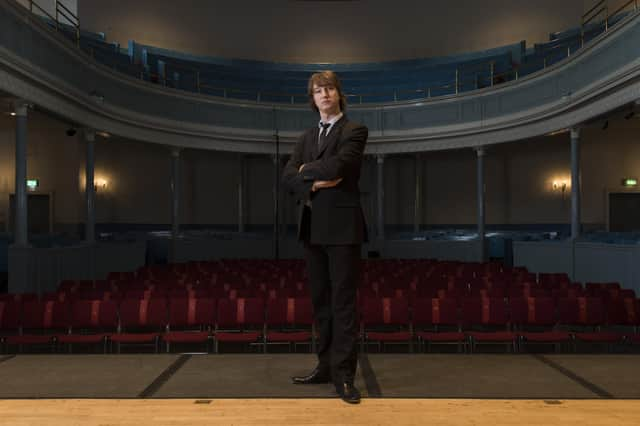2021 Arts Preview: The Year Ahead in Classical Music


“Hope for the best; plan for the worst.” That’s the mantra of RSNO chief executive Alistair Mackie, echoed by every other classical music supremo in Scotland as 2021 dawns.
The good news? There is now genuine optimism within the sector that the anticipated vaccine success will soon allow audiences to return to our concert halls and rediscover the magic of live performance. It’ll happen, they say, but not immediately.
Advertisement
Hide AdAdvertisement
Hide AdSo where does that leave us as regards the crystal ball-gazing that is customary this time of year? Well, the emerging picture is one of cautious hope, creative flexibility, but inevitably very little detail.
Remember what Fergus Linehan, director of the Edinburgh International Festival, said a couple of months ago? “2021 will be the journey back; probably 2022 will be the great celebration.” It’s an acceptance you find expressed across the board, from orchestras, ensembles and choirs, to the many festivals that were cancelled in 2020, and for whom 2021 is no more certain.
What we know is that the early months of 2021 will continue much as before, with bitesize digital seasons. First to confirm was the SCO, with further weekly series from January to April, including three concerts under principal conductor Maxim Emelyanychev. One in particular, featuring singers Claire Booth, Andrew Staples and the wonderful Roderick Williams in Stravinsky’s Pulcinella (4 February), is a notable highlight. The SCO also performs Stravinsky’s The Soldier’s Tale, filmed in the Queen’s Hall and released 7 January.
The BBC SSO has also released details for January and February – all live broadcasts for Radio 3 and including its own mini-focus on Stravinsky, unfortunately with the same two works as the SCO, Pulcinella on 13 February, and The Soldier’s Tale with actor Sam West on 18 February. “The stability provided by our Radio 3 work has been vital in keeping us going,” says SSO director Dominic Parker.
At the time of writing the RSNO had not yet published its details, although Mackie did reveal that the RSNO’s second digital series will move to the Glasgow Royal Concert Hall to enable the programming of bigger repertoire. “With more space, we’ll be sticking to our [originally advertised] spring programme as much a possible,” he promises.
After its opera film successes of 2020, Scottish Opera offers a January production of Humperdinck’s Hansel and Gretel. General director Alex Reedijk hopes to repeat the winning ways of last year’s live outdoor La bohème with another, as yet unnamed, opera in May or June. “We’re also revisiting [Gilbert and Sullivan’s] The Gondoliers and Utopia, which fell victim last season. We’ll do an audio recording in February, for release in due course, with hopes of staging it in autumn to a live audience.”
And that’s the question on everyone’s lips: when can audiences return to the opera theatres and concerts halls? The consensus is that we shouldn’t expect any movement on that until around September, when the new seasons would normally get underway.
Advertisement
Hide AdAdvertisement
Hide AdMore interesting, perhaps, is the impact the contingencies put in place for Covid are likely to have on future programming. There’s the digital screening expertise that has been a lifesaver for all these companies, and others such as the Dunedin Consort and the Scottish Ensemble. Most now see that as a creative resource to be integrated with live programming. “The genie’s out the bottle,” says SCO chief executive Gavin Reid.
To varying degrees, there’s an awakening to the creative opportunities shorter range planning affords. Mackie is the one most sold on the concept. “I like being more responsive,” he says. “We’ve discovered artists, composers and been able to put them in at a month’s notice. I love having an element of our season that is reactive. It’s something we’re talking about at the RSNO.” Watch this space.
There’s no question that 2021 will see significant changes in the way classical music organisations operate. And that’s before we even bring Brexit into the equation. Most view it with the same pragmatism as Mackie, who says “I don’t buy into all this fear of massive disruption. We’re supposed to be in the creative industries. When we know what the challenges are, we’ll be creative about solving them.” That was proved in 2020. Roll on 2021.
A message from the Editor:
Thank you for reading this story on our website. While I have your attention, I also have an important request to make of you.
The dramatic events of 2020 are having a major impact on many of our advertisers - and consequently the revenue we receive. We are now more reliant than ever on you taking out a digital subscription to support our journalism.
To subscribe to scotsman.com and enjoy unlimited access to Scottish news and information online and on our app, visit https://www.scotsman.com/subscriptions
Joy Yates, Editorial Director